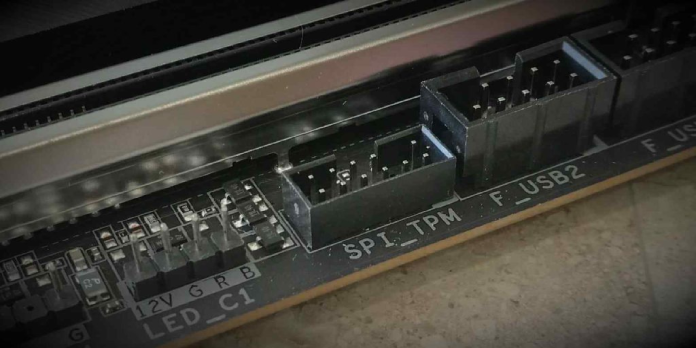Here we can see, “How to: Fix Your Computer’s Trusted Platform Module Has Malfunctioned”
- The corrupted TPM appears to be the root cause of malfunctioning the Computer trusted platform.
- One of the simplest fixes for this issue on your PC is to clear the TPM keys.
- Your next move should be to disable specific Windows components if that doesn’t work.
The Trusted Platform Module protects your PC, but some users have reported receiving the error message. Your computer’s trusted platform has malfunctioned.
You may already be aware that the TPM is used to save your login information securely; therefore, if there is a problem with this function, you might not be able to access some services.
This security feature also encrypts your files and checks the bootloader’s integrity, so it’s critical that it functions properly.
These issues can be concerning because they jeopardize your system’s security; therefore, in today’s article, we’ll show you how to fix this nuisance on your system permanently.
Outlook 2016 with Office 365 account keeps prompting for password. After entering it, an error pops up “Your computer’s Trusted Platform Module has malfunctioned. If this error persists, contact your system administrator with the error code 80090030.
What causes the Your computer’s trusted platform module has malfunctioned error?
It appears that the new Microsoft PC Health Check software, which lets you rapidly determine whether your computer can be upgraded to Windows 11, may cause this issue.
We think that at least some of the short fixes listed below should resolve the problem. Do bear in mind that this issue might occasionally also be brought on by installed Windows components.
What does TPM do?
TPM is a computer chip that safeguards your private data, including encryption keys, passwords, and certificates.
Additionally, the technology protects against bootloader tampering. No malware will be able to run prior to Windows by doing this.
How can I fix Your computer trusted platform has malfunctioned error?
1. Clear your TPM keys
-
- Type “defender” by pressing the Windows Key + S. Click on Windows Security after finding it.
- Click on the Security processor details after choosing Device security.
- To debug the security processor, click.
- Then choose Clear TPM.
- When you’re finished, restart your computer.
2. Switch TPM on or off
-
- For the Run, window to appear, press Windows Key + R.
- When the Run dialog appears, enter tpm.msc into the box.
- Select Turn TPM Off from the Action panel by clicking it.
- Your computer should be restarted to see if the issue has been fixed.
3. Prepare your TPM
-
- To access tpm.msc, press Windows Key + R., then hit Enter.
- In the module window’s upper right corner, click Prepare your TPM.
- Once you’re done, confirm any dialog boxes and restart your computer.
4. Disable Hyper-V
-
- Access control by pressing Windows Key + R. Select OK.
- Click on Programs now.
- You should then click the Turn Windows features on-off button.
- Find the Hyper-V option now, and then uncheck it.
- To save your changes and restart your computer, only click OK.
Which apps use TPM?
TPM is compatible with a wide range of applications, including several VPN programs, most notably Cisco client VPNs.
TPM primarily relies on file encryption technologies like Microsoft BitLocker to protect your files from illegal access.
You can see this feature’s importance because email clients like Outlook employ it for further security.
How do I enable TPM?
-
- By hitting F2 during boot, you can access UEFI.
- Activate the Advanced tab.
- Choose CPU Configuration next.
- The AMD CPU fTPM switch should be located and set.
Remember that depending on your motherboard manufacturer, this procedure may vary.
It can be difficult to operate your favorite apps when this issue occurs. Most of the time, clearing your TPM keys will take care of this problem, but if it doesn’t work, you can try turning off particular Windows features.
Conclusion
I hope you found this guide useful. If you’ve got any questions or comments, don’t hesitate to use the shape below.
User Questions
1. How can a broken trusted platform module be fixed?
Choose Settings (the gear icon) from the Start menu, then Update & Security, Windows Security, and Device Security. Select Security processor information > Security processor troubleshooting from the Security processor menu. Choose Clear TPM. Try again to activate Microsoft 365 after restarting the device.
2. What does a malfunctioning trusted platform module mean?
The Trusted Platform Module (TPM) is a specialized micro-controller that uses built-in cryptographic keys to protect a system’s hardware. Because of this, some or all of the Windows components installed on your device may not work properly if it has malfunctioned or become corrupted for any reason.
3. How can I install the TPM driver again?
Expand the menu by selecting Security Devices in the Device Manager box. Update the driver by doing a right-click on Trusted Platform Module 2.0. Choose Search automatically for drivers from the update prompt. The most recent TPM 2.0 driver will be downloaded and installed by Windows on its own.
4. Anyone else notice a sudden rise in TPM related issues?
Anyone else notice a sudden rise in TPM related issues? from sysadmin
5. Error code 80090030 when logging into Office 365 : r/sysadmin
Error code 80090030 when logging into Office 365 from sysadmin



